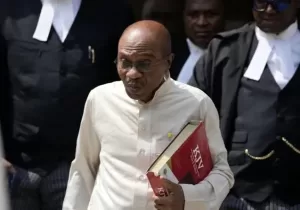The Lagos State Special Offences Court in Ikeja has assumed jurisdiction to hear the allegations of accepting gratification, corrupt demand and receiving property fraudulently obtained made against the former governor of the Central Bank of Nigeria, Godwin Emefiele.
Justice Rahman Oshodi in his ruling delivered on Wednesday held that the prosecution, the Economic and Financial Crimes Commission (EFCC) successfully established that the court has territorial jurisdiction to entertain counts 8 to 20 of the 26 count charge made against the former CBN Governor based on various facts presented in the evidence attached to the case file.
The court, however, agreed with lawyers to Emefiele, that counts 1 to 4 of the charge are unconstitutional, as they are not based on any existing laws in Nigeria.
On April 8, 2024, the EFCC had arraigned Emefiele before the court on the 26-count charge bordering on alleged abuse of office and irregular allocation of $4.5 billion and N2.8 billion respectively.
The former CBN Governor was specifically mentioned in counts 1 to 4 as well as counts 8 to 26 bordering on alleged abuse of office, contrary to and punishable under Section 73 of the Criminal Law of Lagos 2011; accepting gratification, contrary and punishable under Section 8 of the Corrupt Practices and Other Related Offences Act 2000; corrupt demand, contrary and punishable under Section 10 of the Corrupt Practices and Other Related Offences Act 2000; receiving property fraudulently obtained, contrary to and punishable under Section 328 of the Criminal Law of Lagos 2011; and conferring corrupt advantage, contrary to Section 19 of the Corrupt Practices and Other Related Offences Act 2000.
In his ruling, Justice Oshodi noted that while counts 1 to 4 relate to the general offence of abuse of office as defined by criminal law, the specific conduct alleged in those counts specifically, the allocation of foreign exchange without a bid is not defined as an offence in any written law. Consequently, the court struck out these counts.
READ ALSO: EFCC sacks 27 officers over fraud, misconduct
Regarding counts 8 to 26, the judge emphasised that by applying established legal principles, the evidence presented was sufficient to affirm the court’s territorial jurisdiction.
He, therefore, dismissed Emefiele’s application and held that EFCC had established a territorial jurisdiction on counts eight to 26, with various facts in the proof of evidence attached to the case file.

The court, however, struck out counts one to four of the charge which bothered on abuse of office.
He said that allocation of foreign exchange without bid, which was the subject of counts one to four was not punishable under the law.
Oshodi said: “Allocation of foreign exchange without reason is not defined as an offence in any written law.
“The objection to counts one to four succeeds and is hereby struck out.
“The objection challenging the court’s territorial jurisdiction over count eight to 26 fails, and is hereby dismissed.
“The prosecution has established sufficient territorial nexus in this case”.
Justice Oshodi, however, clarified that this finding is limited solely to the jurisdictional objection and does not address the merits of the allegations against Emefiele.
Justice Rahman Oshodi subsequently ruled that the objection challenging the court’s territorial jurisdiction over counts 8 to 26 fails and is thereby dismissed, noting that the prosecution has established a sufficient territorial nexus to compel Emefiele to answer the charges.
The court has adjourned to February 24 and 26 for continuation of the trial.

